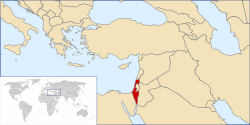Israel and nuclear weapons
| Israel | |
|---|---|
 |
|
| Nuclear program start date | 1948–1949 |
| First nuclear weapon test | Unknown; Partner in early French testing 1960, reported local Israeli underground test 1963, suspected in Vela Incident 1979, per BAS "If the 1979 flash was caused by a test, most experts agree it was probably an Israeli test" |
| First fusion weapon test | Unknown |
| Last nuclear test | Unknown |
| Largest yield test | Unknown |
| Total tests | Unknown |
| Current stockpile (usable and not) | estimated 80–400 warheads |
| Current strategic arsenal | Unknown |
| Cumulative strategic arsenal in megatonnage | Unknown |
| Maximum missile range | estimated up to 11,500 km |
| NPT party | No |
Israel is widely believed to possess nuclear weapons and to be the sixth country in the world to have developed them, allegedly having built its first deliverable nuclear weapon in December 1966 based on scientific and industrial cooperation with pre-nuclear France. It is one of four nuclear-armed countries not recognized as a Nuclear Weapons State by the Non-Proliferation Treaty (NPT); the others being India, Pakistan, and North Korea. Israel maintains a policy known as "nuclear ambiguity" (also known as "nuclear opacity"). Israel has never officially denied nor admitted to having nuclear weapons, instead repeating over the years that it would not be the first country to "introduce" nuclear weapons to the Middle East, leaving ambiguity as to whether it means it will not create, will not disclose, will not make first use of the weapons or possibly some other interpretation of the phrase. The "not be the first" formulation goes back to the Eshkol-Comer (sic) memorandum of understanding made between Israel and the United States on March 10, 1965, which contained Israel's written assurance for the first time that it would not be the first to introduce nuclear weapons in the Middle East. Israel has refused to sign the NPT despite international pressure to do so, and has stated that signing the NPT would be contrary to its national security interests.
Additionally, Israel has made extensive efforts to deny other regional actors the ability to acquire their own nuclear weapons. The counter-proliferation, preventive strike Begin Doctrine added another dimension to Israel's existing nuclear policy. Israel remains the only country in the Middle East believed to possess them.
...
Wikipedia
